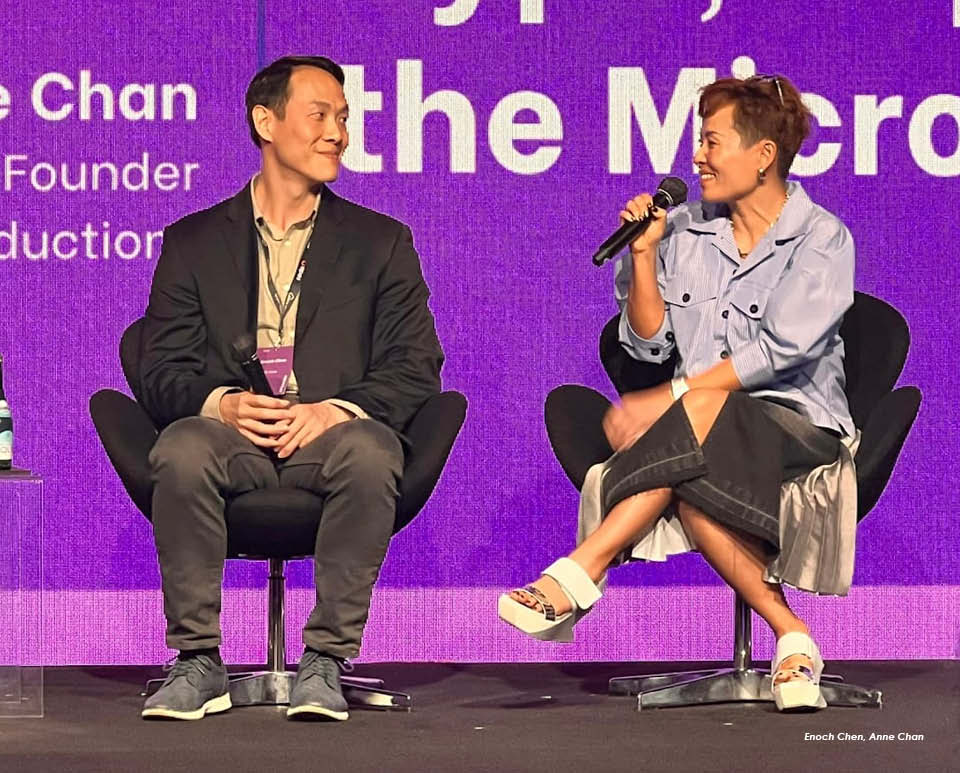
Micro dramas (aka vertical videos) could be the catalyst for a revival of the South Korean screen industry – or even help the Korean industry challenge that of China. Chinese micro drama producers, meanwhile, are intent on using their current momentum to further expand their current business models into overseas markets.
Both positions were aired as this year's APOS convention in Bali headed to its close.
“The international market is set to experience what China has already seen,” said Zhou Yuan, CEO and founder of Content Republic, a new entrant to the Chinese micro drama segment, and an offshoot of film and TV producer, Linmon Media.
Though the micro drama format is dominated by low-cost shows touting rehashed, salacious or brash storylines, China’s domestic micro drama sector is growing quickly. The sector in 2024 was estimated to be worth US$6-7 billion, a figure bigger than the country’s softening theatrical segment. Korea’s acclaimed film and TV industries are currently in the doldrums, reflected in theatrical box office that has failed to recover pre-COVID heights, and TV fiction production volume that is 15-20% below 2022 levels.
“Rising drama costs have made it hard for [Korean] producers to recoup. Micro dramas may be a solution,” said Lee Min-seok, CEO of Korea’s WhyNot Media. “Or they may be a means of coping with changing viewer behaviour.”
“Korea has the potential to lead the world’s micro drama market, especially if we can build long-term attention, rather than one-time consumption,” said Song Jiyeon, head of content at Korean platform, TopReels.
Signalling a major shift in strategy at one of Korea’s leading production companies, KT Studio Genie CEO Chris Jung said the company "is no longer only a TV drama production company, but is interested in different kinds of content […] We are the only studio in Korea who is thinking seriously about micro dramas".
Studio Genie began its micro-drama diversification earlier this year and has already pivoted its strategy. The initial “platform...
Micro dramas (aka vertical videos) could be the catalyst for a revival of the South Korean screen industry – or even help the Korean industry challenge that of China. Chinese micro drama producers, meanwhile, are intent on using their current momentum to further expand their current business models into overseas markets.
Both positions were aired as this year's APOS convention in Bali headed to its close.
“The international market is set to experience what China has already seen,” said Zhou Yuan, CEO and founder of Content Republic, a new entrant to the Chinese micro drama segment, and an offshoot of film and TV producer, Linmon Media.
Though the micro drama format is dominated by low-cost shows touting rehashed, salacious or brash storylines, China’s domestic micro drama sector is growing quickly. The sector in 2024 was estimated to be worth US$6-7 billion, a figure bigger than the country’s softening theatrical segment. Korea’s acclaimed film and TV industries are currently in the doldrums, reflected in theatrical box office that has failed to recover pre-COVID heights, and TV fiction production volume that is 15-20% below 2022 levels.
“Rising drama costs have made it hard for [Korean] producers to recoup. Micro dramas may be a solution,” said Lee Min-seok, CEO of Korea’s WhyNot Media. “Or they may be a means of coping with changing viewer behaviour.”
“Korea has the potential to lead the world’s micro drama market, especially if we can build long-term attention, rather than one-time consumption,” said Song Jiyeon, head of content at Korean platform, TopReels.
Signalling a major shift in strategy at one of Korea’s leading production companies, KT Studio Genie CEO Chris Jung said the company "is no longer only a TV drama production company, but is interested in different kinds of content […] We are the only studio in Korea who is thinking seriously about micro dramas".
Studio Genie began its micro-drama diversification earlier this year and has already pivoted its strategy. The initial “platform model", seemingly challenging existing purveyors in Korea, such as TopReels, Vigloo and Shortcha, has now shifted to a ‘studio model’, taken to mean a focus on production and supply, rather than being the consumer-facing retailer.
Jung said competing against global players would be tough and that consolidation of the nascent Korean micro drama market could take four to five years.
He explained that micro drama sector attractions included the ability to deploy artificial intelligence (AI), and said Studio Genie had partnered with OpenAI on changing the production process.
"Those are functional benefits. But AI can change how the story is made. And we can integrate it more aggressively into the micro drama production process than in long form," he said.
TopReels’ Song said he was “against the perception that micro dramas have to be snackable and disposable. They are not necessarily inferior to long format dramas... The typical [Korean micro drama] consumer has more in common with webnovel users than they do with long form viewers."
Multiple business models exist side by side – ranging from pay-per-episode to weekly or monthly subscriptions and ad-supported (AVOD) – and neither Chinese nor international markets have yet settled on one system.
“The best performer changes every month, but I expect the subscription model to win out,” Song added.
“Korea is full of content businesses, storytelling, good looking boys and girls. We may come up with a game changer,” said Lee. “But there is much to learn from Chinese players and others.”
“Marketing is crucial and for that we rely heavily on social media, like the gaming industry. This helps us to target, optimise and the find highest paying users,” said Enoch Chen of China’s COL Group.
But he offered a warning to any company hoping to offer a single business model.
“As we expand abroad, we find that the AVOD model is favoured over subscription tiers in places such as Southeast Asia. And that ad conversion rates in Indonesia are 2%, compared with 8% in the U.S.,” he said.
Independents lack the power of the Chinese super apps, but communities can still be built and create stickiness, Chen added.
Anne Chan, founder of China’s AR Asia Productions, said partnerships with national or regional telco firms were important.
AR Asia has established partnerships with major telcos, including AIS in Thailand, Celcom Digi in Malaysia, and Telkomsel in Indonesia, among others.
“We partner with telco firms to develop optimal pricing models that effectively reduce customer churn," she said.
Looking ahead to the next 6 to 12 months, Chan anticipates the launch of extensive micro drama bundles that will be integrated into various telco app packages.
With both growth, consolidation and AI evolution set to shape the business in the near to medium term future, speakers could not agree whether a Netflix-like market leader would emerge.
“Our goal is to be the global hub of micro drama. But to achieve that, the local aspects will be important to get right,” said Chen.
Best bets are that the market leader will continue to be a Chinese platform. Zhou agreed with Chan on this. “I don’t think there will be a Netflix of micro dramas,” he said. – By Patrick Frater































